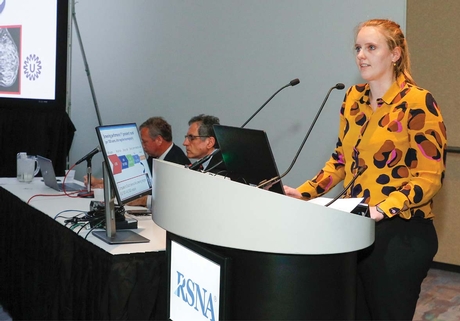Supplemental MRI screening in women with extremely dense breasts results in statistically significantly fewer interval breast cancers, or cancers found between screenings, according to presenters of a Sunday session.

de Lange
Breast density is an independent risk factor for breast cancer that also can make cancers more difficult to see on mammograms. As a result, additional MRI screening has been proposed for women with dense breasts. There is a heated debate on the value of this supplemental screening because higher sensitivity of MRI for cancer detection may come at the cost of more recalls for additional tests on women who subsequently turn out to have no cancer.
In the study, which was included in the Best Clinical Trials @RSNA 2019, Dutch researchers evaluated the effect of supplemental MRI for women with extremely dense breasts in a population-based screening program. The study group included 40,373 screening participants, ages 50 to 75, with a negative screening mammography and extremely dense breasts.
The researchers invited more than 8,000 of the women in the study to receive 3-T MRI two years after their mammography. More than 4,700 women agreed, and their results were compared with those who subsequently had mammography screening only during a two-year screening interval.
The cancer detection rate was 16.5 per 1,000 women for women who received MRI, which is considerably higher than the 6.8 per 1,000 detection level of the Dutch mammography screening program. Almost 83% of the cancers detected in the MRI arm of the study were at a very early stage, compared with only 41.6% of cancers in the mammography-only group. Analysis showed that the addition of MRI resulted in a reduction in interval cancers of 2.5 per 1,000 women.
"Supplemental screening versus mammography alone results in the detection of earlier-stage cancers and fewer interval cancers," said study co-author Stéphanie de Lange, MD, from the University Medical Center (UMC) Utrecht, the Netherlands. "In subsequent rounds of screening, the cancer detection rate achieved the expected level and false-positive results decreased."
"With more training, or perhaps artificial intelligence assistance, it is not impossible for this number of interval cancers to drop to zero in the future, although we're not there just yet," added study co-author Wouter B. Veldhuis, MD, PhD, from UMC.
A Balance Between Efficacy and Societal Burden
In order to achieve the higher cancer detection rate, 9.5% of women who had MRI were recalled for additional screening, including 6.3% for biopsy.
Dr. Veldhuis noted that, as with any screening modality, a balance needs to be found between efficacy and societal burden. To be implemented as a screening modality, he said, a method needs to be effective in correctly reporting "no cancer" in women without cancer and "cancer" in women with the disease.
"Recommending MRI as a supplement is a societal discussion in which this result will play a role," he said. "The result itself is not enough to base the decision on."
The researchers also surveyed the women who turned down the opportunity for supplemental screening with MRI. Inconvenience and anxiety about the exam itself and the possibility of cancer detection were the primary reasons they cited, Dr. de Lange said.
The Dutch team is finishing a study that uses a mathematical model to estimate if the early breast cancer detection with MRI leads to a reduction in breast cancer mortality, and how it might affect the extent and cost of treatment.
"If the long-term benefits outweigh the harms, then MRI examination for women with extremely dense breasts can be an important step up, from a one-size-fits-all to a tailor-made breast cancer screening program," Dr. Veldhuis said.
After the presentation, Christopher E. Comstock, MD, praised the Dutch study for its focus on interval cancers, often considered the best available measure for breast cancer mortality reduction. Dr. Comstock, a diagnostic radiologist and breast imager from Memorial Sloan Kettering Cancer Center in New York City, presented the session, "Discussant for MRI in Addition to Mammography Screening," in the Best Clinical Trials @RSNA 2019.
Related links:

